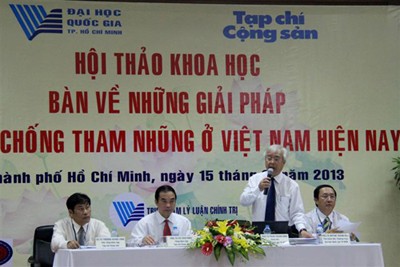(VOVworld) – At the on-going 6th session of the 13th National Assembly, the deputies agreed on the importance of creating consensus to effectively combat corruption. Although this is not a new topic, the deputies have proposed new recommendations to minimize and sweep out corruption.

A conference on anti-corruption measures (noichinh.vn) |
Reviewing preventive mechanism
In face of worsening corruption in many sectors under more complicated forms, Do Kim Tuyen, Deputy Head of the General Department of Crime Prevention and Control of the Ministry of Public Security, said Vietnamese functional agencies have to continue to amend loopholes in management and monitoring mechanisms. Tuyen, a National Assembly deputy for Hanoi, said anti-corruption agencies of the Ministry of Public Security and the Government Inspectorate have some limitations in their organization and performance. “Combating crime and corruption is important work. We ask the National Assembly to strengthen its supervision in this work. It’s necessary to strengthen weaknesses in state governance by reviewing policies and mechanisms on inspecting, monitoring, and handling violations.”
Nguyen Dinh Quyen, Deputy Head of the National Assembly’s Committee for Judicial Affairs, said existing preventive measures have not been effective. Internal inspection has been unable to detect corruption which shows a compromise in management. “We have to review preventive mechanisms. We acknowledge that publicity and transparency is the most effective way. We have to make public all criteria ranging from recruiting and appointing officials, to bidding projects and implementing the national target program. It’s necessary to impose criminal punishments in dealing with corruption.”
Refining law on corruption prevention and combat
Nguyen Thi Quyet Tam, a deputy for Ho Chi Minh city, proposed a review of investigated corruption cases and identify loopholes so the National Assembly can focus their time on revising anti-corruption regulations. She suggested the National Assembly hold symposium on anti-corruption if necessary.
Do Manh Hung, Deputy Head of the National Assembly Committee for Social Affairs, proposed a strong anti-corruption system under the National Assembly. Vietnam has a Central Steering Committee for Anti-corruption, which administers guidelines, orientations, and mechanisms. Weaknesses in preventing and combating corruption lie in the execution. It’s important to form a strong, independent anti-corruption mechanism under the National Assembly.
Breaking major corruption cases
Many deputies said the National Assembly needs to issue a resolution to require the inspectorate, auditors, procuracy, and court to limit the number of suspended sentences. Suspended sentences will not be widely imposed. Deputy Do Van Duong of Ho Chi Minh city recommended to review the staff of local and central anti-corruption agencies. “It’s necessary to investigate corruption at the centre of money and power which is equivalent to thousands of small corruption cases. It’s ineffective if we don’t adjust our anti-corruption methods and massively combat corruption.”
The National Assembly deputies said combating corruption is a long and hard process but it requires visible changes year after year. Their proposals will make corruption prevention and combat more effective.